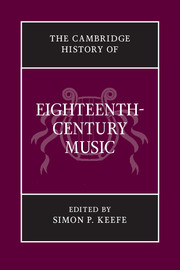Book contents
- Frontmatter
- PRELUDE
- PART I MUSIC FOR THE CHURCH
- INTERLUDE
- PART II MUSIC FOR THE THEATRE
- INTERLUDE
- PART III MUSIC FOR THE SALON AND CONCERT ROOM
- 16 Keyboard music from Couperin to early Beethoven
- 17 The serenata in the eighteenth century
- 18 Private music in public spheres: chamber cantata and song
- 19 Handel and English oratorio
- 20 The overture-suite, concerto grosso, ripieno concerto and Harmoniemusik in the eighteenth century
- 21 Concerto of the individual
- 22 Eighteenth-century symphonies: an unfinished dialogue
- 23 The string quartet
- POSTLUDE
- Appendix I Chronology
- Appendix II Institutions in major European cities
- Appendix III Personalia
- Index
- References
19 - Handel and English oratorio
from PART III - MUSIC FOR THE SALON AND CONCERT ROOM
Published online by Cambridge University Press: 28 March 2011
- Frontmatter
- PRELUDE
- PART I MUSIC FOR THE CHURCH
- INTERLUDE
- PART II MUSIC FOR THE THEATRE
- INTERLUDE
- PART III MUSIC FOR THE SALON AND CONCERT ROOM
- 16 Keyboard music from Couperin to early Beethoven
- 17 The serenata in the eighteenth century
- 18 Private music in public spheres: chamber cantata and song
- 19 Handel and English oratorio
- 20 The overture-suite, concerto grosso, ripieno concerto and Harmoniemusik in the eighteenth century
- 21 Concerto of the individual
- 22 Eighteenth-century symphonies: an unfinished dialogue
- 23 The string quartet
- POSTLUDE
- Appendix I Chronology
- Appendix II Institutions in major European cities
- Appendix III Personalia
- Index
- References
Summary
When we think of eighteenth-century oratorio today, the composer whose name comes to mind almost immediately – and inevitably – is George Frideric Handel. This is less a statement about the indisputable artistic merit of his oratorios than about the extraordinary status Handel’s oratorios acquired even in their own time, especially when considered in broad historical context: English oratorio was to all intents and purposes created by Handel, and his creation had a tremendous influence on the musical history of his chosen country of residence long after his death.
When Handel arrived in London in 1712, oratorio was still an unknown musical genre there. In the 1730s and 1740s Handel gradually developed an entirely unique English variant, skilfully combining elements taken from Italian opera and oratorio, the English anthem and other sources. The end result – if Handel can be said ever to have arrived at a ‘final’ version of the form – was so different from contemporary oratorio on the Continent that it has to be considered on its own. Another factor to be taken into account is that Handel developed English oratorio virtually single-handedly. English composers took an interest in the genre during the 1730s and 1740s, notably Maurice Greene (The Song of Deborah and Barak, completed and performed only a few months after the first London performances of Handel’s Esther in 1732, as well as Jephtha (1737) and The Force of Truth (1744)), and William Boyce (David’s Lamentation over Saul and Jonathan (1736) and the serenata Solomon (1742)).
- Type
- Chapter
- Information
- The Cambridge History of Eighteenth-Century Music , pp. 541 - 555Publisher: Cambridge University PressPrint publication year: 2009

